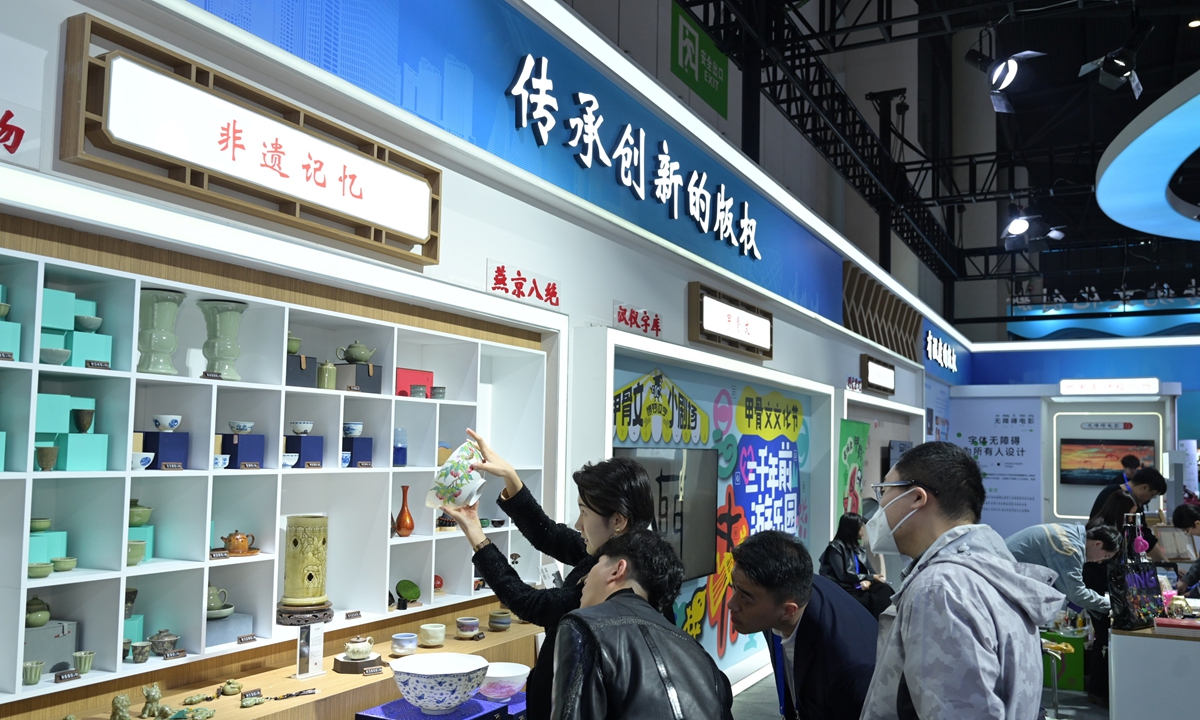ARTS / CULTURE & LEISURE
9th China International Copyright Expo to open in SW China
Metaverse exhibition highlight of event

Promotional material of the 9th China International Copyright Expo Photo: Courtesy of Capital Copyright Society
The 9th China International Copyright Expo, scheduled to take place in Chengdu, Southwest China's Sichuan Province, from Thursday to Saturday, promises a myriad of digital experiences and interactive showcases. Among the innovative features of this edition is the first introduction of an online metaverse exhibition that offers live broadcasts from the expo and forums.
This metaverse initiative not only provides a virtual rendition of the expo but also enhances the interactive experience with digital applications. Leveraging digital guides, it creatively showcases and promotes industry cases related to copyright infrastructure, content creation and copyright operations. This includes services such as work registration, copyright certification and supply-demand matchmaking - a pioneering approach fostering the transformation and development of the digital copyright industry.
With active participation from 81 exhibitors nationwide, more than 1,000 digital copyright works spanning games, animation, film, intangible cultural heritage, cultural relics and arts are set to be showcased at the expo.
A focal point in the digitization of cultural heritage is the "China Wenbao Chain" project. Cui Wei, head of the project, told the Global Times on Wednesday that taking aim at the inheritance, popularization of Chinese culture, intellectual property protection in cultural relics, and the commercial development of the cultural and creative industries, this project strives to establish a robust digital system for preserving and digitizing outstanding Chinese cultural relics.
The chain extends its services to various digital application platforms, including digital publishing distribution, digital exhibition showcasing, digital cultural tourism, digital cultural relics and museums, metaverse scenarios and digital asset transactions. It offers authoritative and trustworthy digital certification services to society at large.
Looking ahead, Cui said the cultural heritage chain is poised to align with the country's cultural digitization strategy, implement the essential elements of building a strong intellectual property country, and contribute to the high-quality development of new museum infrastructure. It aims to construct a National Cultural Heritage Comprehension Service Platform to aid in the protection, dissemination and utilization of world cultural heritage.
Under the theme "New Era of Copyright, Empowering New Development," the expo adopts a blended approach of online and offline integration, featuring four pavilions and five major exhibition areas, covering an offline exhibition area of 52,000 square meters.
Encompassing more than 20 countries and international organizations, including the EU, East Asia, ASEAN and Central Africa, this expo will witness the participation of officials from copyright management authorities of various countries, such as Cambodia, Mongolia, Pakistan, Nepal and Japan. This broadens the scope, fields and depth of international copyright exchange and cooperation, further enhancing China's international influence and promoting alignment between China's copyright industry and the world. This, in turn, elevates the nation's cultural soft power and the influence of Chinese culture globally, China Central Television reported.
Another highlight of this year's expo is the Capital Copyright Society's capital copyright exhibition area. Notably, this section will feature a dedicated area showcasing the achievements of the implementation of the Marrakesh Treaty one year after its adoption in China.
Wo Shuping, chief editor of China Braille Press, told the Global Times on Wednesday that visitors can explore accessible copyright products, including Braille books, computers for the visually impaired, and accessible font libraries. Through on-site sharing, interactive performances and public welfare promotion, the exhibition aims to raise awareness and care for the visually impaired community.
Another focal point is the emphasis on cultural heritage, allowing visitors to experience the power of copyright when it comes to cultural inheritance and sharing compelling stories of contemporary China.
For instance, the Anhui exhibition area will display exquisite folk art such as the "Four Treasures of the Study," an expression used to denote the brush, ink, paper and ink stone used in Chinese calligraphy, and Huizhou carvings. Meanwhile, Guangdong's exhibition hall is set to feature folk art performances unique to the Lingnan region, including martial arts and Chaozhou-style kung fu tea, a Chinese tea brewing practice that emerged in Chaozhou during the Ming Dynasty (1368-1644).
As the only comprehensive, international and national-level professional expo in the field of copyright in China, the China International Copyright Expo, organized by the National Copyright Administration since its inception in 2008, has successfully held eight editions, becoming a key platform for the exchange and development of the country's copyright industry.

